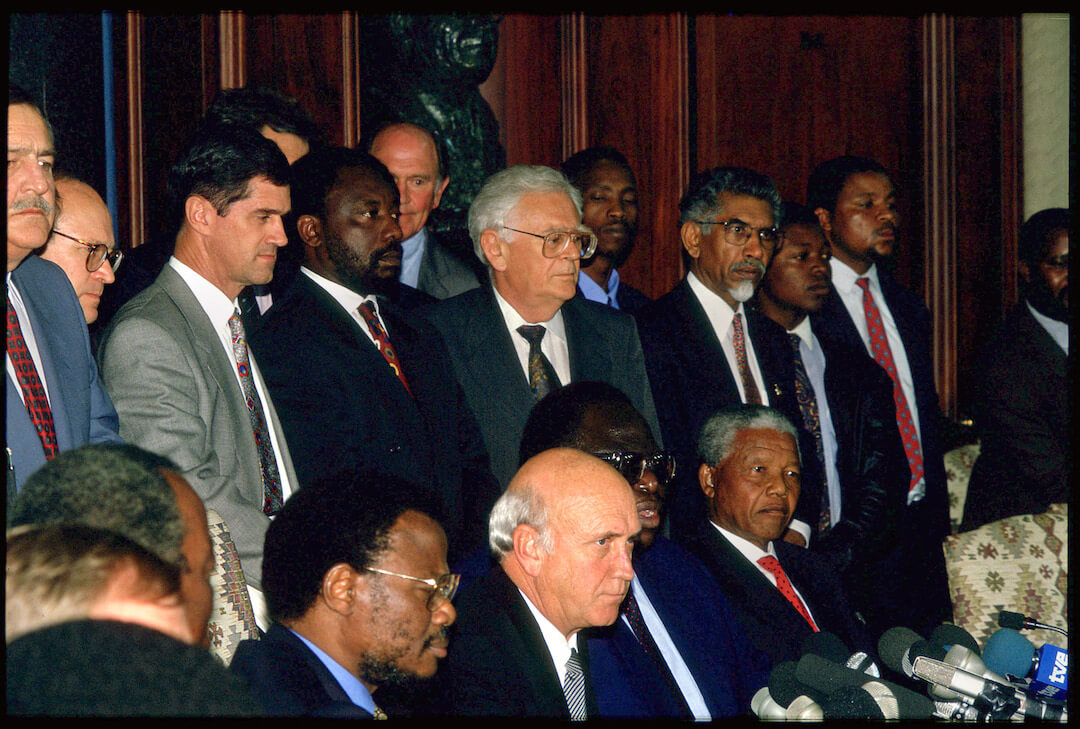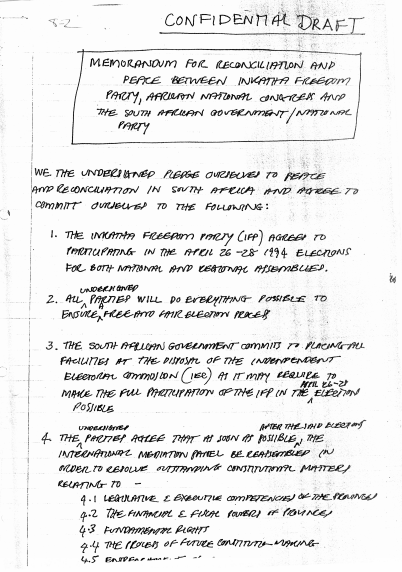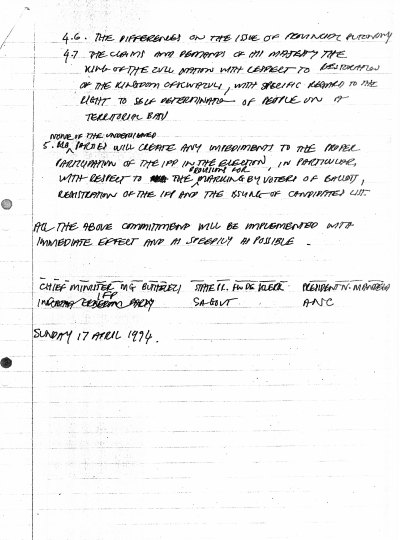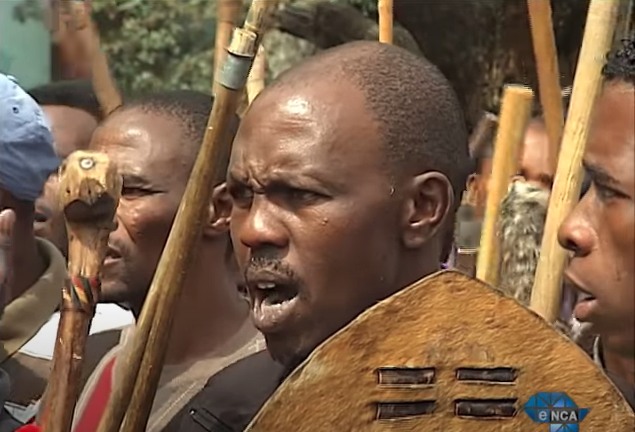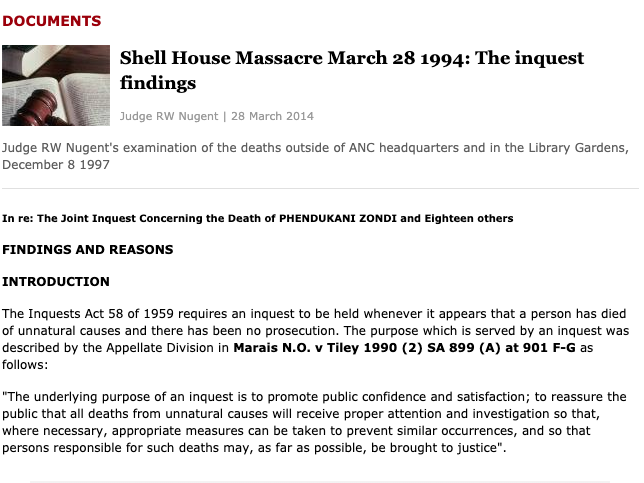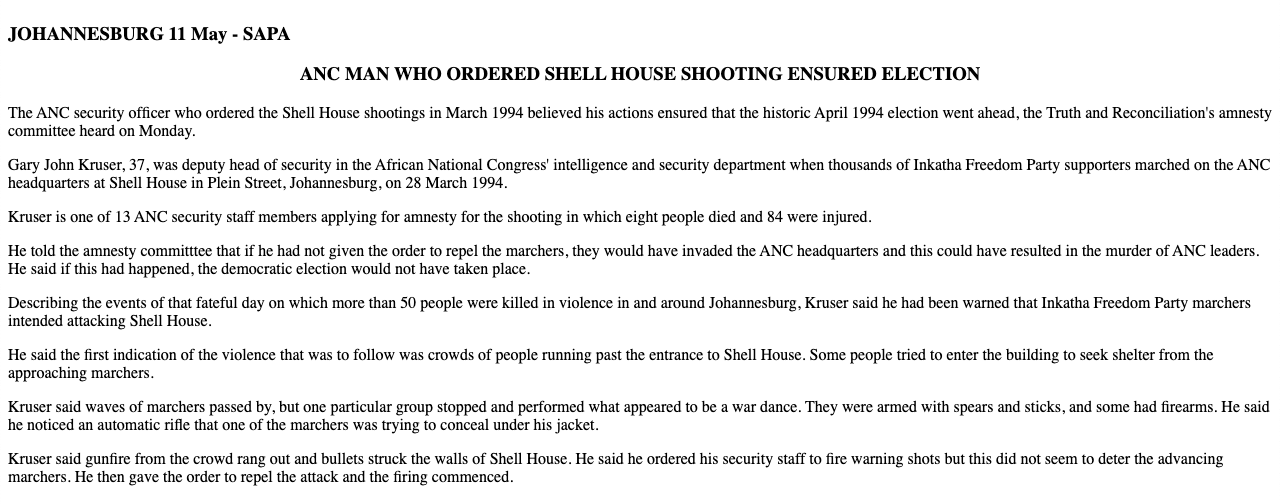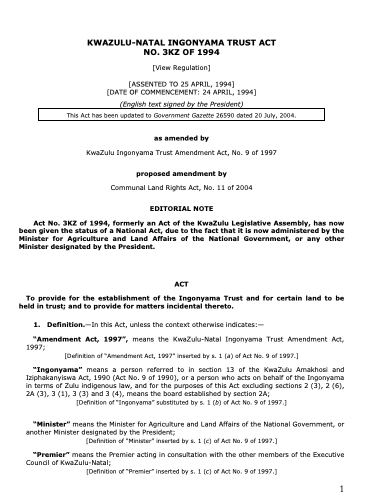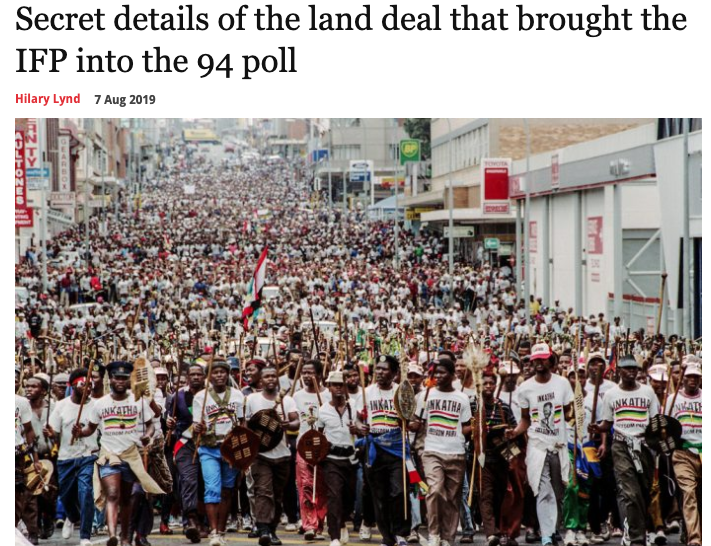The Aftermath of the Shell House massacre
28 MARCH 1994
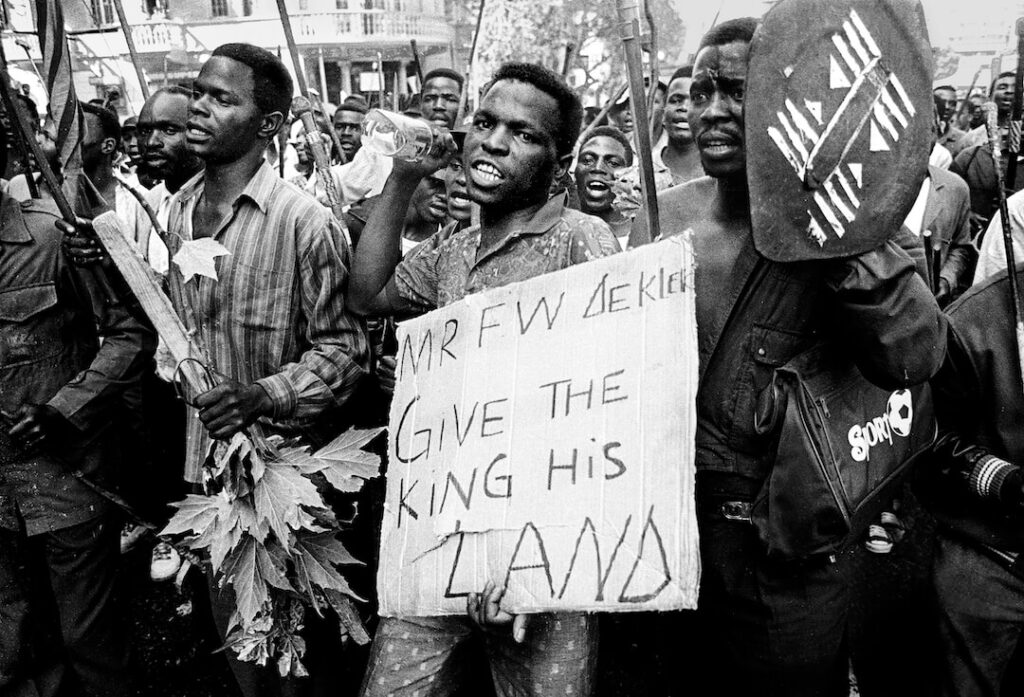
Paul Weinberg / South Photos / Africa Media Online
Directly after the
Shell House massacre:
A state of emergency was declared across eleven districts in the East Rand and across the KwaZulu province in an attempt to halt the escalation of violence as well as ensure free and fair elections. IFP leader Chief Buthelezi vowed to fight the ANC “to the finish” unless the elections were postponed. President De Klerk appointed an inquest, led by Judge Robert Nugent, to investigate the massacre. Mandela later stated that he had given the instruction to ANC guards to repel an IFP attack “even if they had to kill people”. (At the Truth and Reconciliation Commission (TRC), 11 ANC staff members were granted amnesty for the massacre.)
Just 18 days before
the election:
During a summit on 8 April 1994, seen by the country as the last chance for peace, Chief Buthelezi, King Zwelithini, the ANC, and the NP deadlocked after fourteen hours of talks on the issue of the IFP’s demands for a federal constitution and the right of the Zulu to be constitutionally recognised. The summit collapsed.
Elections to
go ahead:
Both the ANC and the NP were nonetheless determined to push forward with elections. “We cannot postpone our freedom”, Mandela proclaimed. In the meantime, Chief Buthelezi and other leaders of the IFP threatened that the Zulu campaign to get the right deal ‘would continue for another 100 years if necessary’.
International
mediation:
In a final bid to find a solution, Chief Buthelezi called for international mediation to reconcile the IFP’s demands with the terms of the Interim Constitution. On 14 April 1994, Kenyan diplomat, Washington Okumu, arrived in South Africa to lead talks with the IFP. After meeting Chief Buthelezi at a corporate retreat in the Eastern Transvaal, Okumu reported that the IFP leader was prepared to negotiate further if the position of the Zulu kingdom could be guaranteed.
The IFP’s
proposal:
Delegates from the KwaZulu Government (KZG) proposed first, amending the Interim Constitution to recognise the Zulu King; second to promise further international mediation after the election; and third, to establish a trust to govern KwaZulu. This trust would comprise 29.67% of the land of KwaZulu and become the custodian of the land. King Zwelithini was to be its sole trustee thus creating a mechanism to preserve tribal interests in the land.
Rescued from
the brink:
Delegates from the KwaZulu Government (KZG) proposed first, amending the Interim Constitution to recognise the Zulu King; second to promise further international mediation after the election; and third, to establish a trust to govern KwaZulu. This trust would comprise 29.67% of the land of KwaZulu and become the custodian of the land. King Zwelithini was to be its sole trustee thus creating a mechanism to preserve tribal interests in the land.
A final
amendment:
On 25 April 1994, Parliament gathered a final time to amend the Interim Constitution to recognise the Zulu king, and to legislate that there would be no substantial reduction of provincial powers in the final constitution as compared to the Interim Constitution. The deal secured the legitimacy of the elections and staved off a possible explosion of violence. The same day, De Klerk quietly signed the Ingonyama Trust Act into law. (In 2019, a high-level panel on land reform recommended that Parliament scrap the law.)
Implications of the last-minute
change in the electoral process:
Between 25 and 29 April 1994, the IEC issued an additional 700 000 temporary voters’ cards in KwaZulu; between 600 and 700 more polling stations were identified and set up; and an additional 13 000 staff were recruited. Eighty million ballots had already been printed in England at considerable expense, and because of limited time a reprint was not an option. Instead, 80 million stickers with the IFP’s voting details were added by hand to both the national and the provincial ballots.
In their own words
“The tragic thing for me was that the shooting could have been avoided. I spoke to the police personally and told them just to remove the IFP leaders, Humphrey Ndlovu and Themba Khoza, along with the marchers, away from the ANC headquarters. Why did they plan the march to the ANC headquarters? The ANC had never marched on Inkatha’s headquarters in Ulundi.
The police instead abandoned us to the IFP … The ones we shot at were at the doorstep. They were not marching. They came with machine guns. For the first time the weapons of Umkhonto we Sizwe were used against fellow blacks.”
-Penuell Maduna, then ANC negotiator and member of the ANC Constitutional Committee
“After the Shell House massacre, the Zulu nation carries an additional open wound: those who died because they were exercising their democratic right to oppose the election, shall be celebrated and remembered in various ways which we will announce soon.”
–King Goodwill Zwelithini, King of the Zulu nation
“The central issue remains that the IFP and the KwaZulu Administration are determined to prevent the elections from taking place in Natal. De Klerk should use his office … to address this question rather than descend to cheap politicking when he responds … as to how to prevent further loss of life and ensure that 27 April happens in Natal … What is required is decisive action to prevent a bloodbath.”
-Cyril Ramaphosa, then head of the ANC’s Negotiations Commission
“It was clear in my mind that if we fell into the trap of mediating the election date [with the IFP], the entire process would have been scuttled … Millions of people were geared up for their liberation. If there had been any attempt to postpone the election I think the country would have blown up.”
–Cyril Ramaphosa, then head of the ANC’s Negotiations Commission
“It is vital that we should do this… getting the Bill concerning the land which is now entrusted to the KwaZulu government … passed so that the land that belongs to the nation, to the amakhosi (traditional leaders) and so on, can be secured, if we put it in a trust with His Majesty the King.”
-Chief Mangosuthu Buthelezi, then leader of the IFP
“Of course, this [the IFP joining] was crucial … It was 20% of the electorate. Quite apart from being a very specific identifiable area of dissent, just in terms of numbers it was important.”
–Judge Johann Kriegler, then Chair of the Independent Electoral Commission



